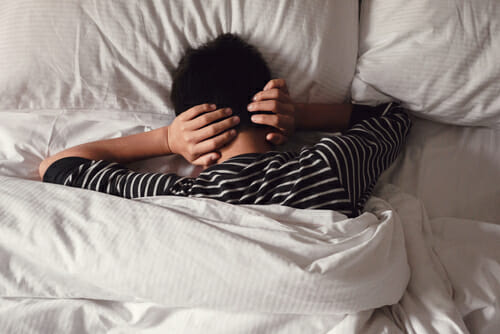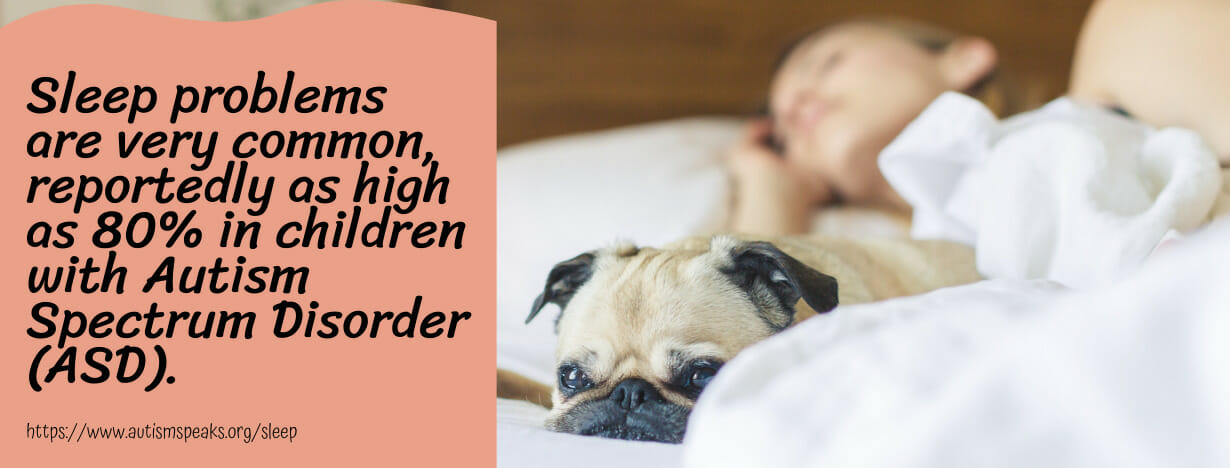Everyone has trouble falling asleep from time to time. But, kids with special needs can have special challenges with falling asleep and staying asleep. Research indicates that between 40 and 80 percent of people with autism experience struggles when it comes to sleep.
These challenges include not being able to fall asleep easily, waking too early, waking up in the middle of the night, and daytime sleepiness. Kids with autism already have special needs, and when they don’t get enough sleep, they often have more struggles with behavior and self-control.

Research on Autistic Children and Sleep
- Strategies to Improve Sleep in Children with Autism Spectrum Disorders (PDF) – School-age kids usually need between 10 and 11 hours of sleep each night, but autistic kids often need less.
- Autism and Sleep – About half of the people with autism also have a sleep disorder.
- Poor Sleep Plagues Many Kids With Autism – Many kids with autism experience anxiety about sleep, making it even more difficult for them to get proper rest.
- Just Keep Sleeping: Ways to Improve Sleep in Children with Autism – Sleep disturbances are a common challenge for children with autism.
- Sleep and Autism Spectrum Disorders (PDF) – Even high-functioning autistic patients experience sleep disruptions and challenges.
- Sleep Difficulties in the First Year of Life Linked to Altered Brain Development in Infants Who Later Develop Autism – Babies need lots of sleep, so sleep problems during the first year can be a common precursor to an autism diagnosis.
- Sleep Problems in Children with Autism – Neurobiologic alterations in the sleep-wake cycle may contribute to sleep disorders in autistic children.
- Investigating Sleep Behaviors in Autistic Infants (PDF) – The presence of sleep disturbances can reduce a child’s quality of life.
- Examining Sleep Problems in Children with Autism Spectrum Disorders (PDF) – Behavioral treatment can help reduce issues with bedtime resistance and night-wakings, which can help with autism management.
- Sleep Issues in Children with Autism Spectrum Disorders Treatment (PDF) – Poor sleep habits can impact other areas of wellness, including immune function, memory, and obesity.

Research on Children with Special Needs and Sleep
- Children with Disabilities and Other Special Needs (PDF) – Children with health issues such as diabetes or asthma have special needs that impact all areas of life.
- Sleep Problems – School-age children should normally be able to fall asleep within 30 minutes, wake up easily in the morning, and stay awake and alert all day.
- Children and Sleep Disorders: What Parents Need to Know – A child’s sleep disorder can manifest itself with snoring, sleep apnea, insomnia, nightmares, sleepwalking, night terrors, and more.
- Go the Bleep to Sleep! How a Pediatric Sleep Specialist Brought Us Some Peace – Sleep difficulties can exhaust not only a child but also the parents.
- Children with Disabilities (PDF) – Disabilities may involve mental or physical health, with each having a number of associated risks and issues.
- Outdoor Light Linked with Teens’ Sleep and Mental Health – Adolescents who live in areas that have high amounts of artificial light at night may experience mood disorders.
- Intellectual Disability – An intellectual disability may involve cognitive or adaptive skills, and sleep problems are an associated health condition of an intellectual disability.
- What are Parasomnias? – Parasomnias could be nightmares, sleepwalking, and sleep talking. Children can be more likely to experience these issues.
- Interventions for Sleep Problems in Pediatrics (PDF) – Sleep interventions can improve sleep duration, which often helps kids feel happier and achieve better grades in school.
- The Upper Airway, Asthma, and Sleep Disorders in Children – When children have obstructed breathing or asthma, sleep quality is usually diminished significantly.
How to Help Your Autistic Child Sleep Better
First Steps – The first step to helping an autistic child improve sleep patterns is to rule out any physical issues that could be negatively affecting sleep.
- Have your child evaluated by a doctor to find out if there are any medical issues that need to be resolved.
- It may also help to track your child’s sleep patterns for a week or two.
- Consider a sleep study to find out if your child is experiencing issues such as sleep apnea or restless leg syndrome.
- Good Night, Sleep Tight, and Don’t Let the Bed Bugs Bite: Establishing Positive Sleep Patterns for Young Children with Autism Spectrum
Home Environment – Your home environment plays a big role in how your child rests and sleeps.
- Control the amount of light that enters your child’s bedroom.
- Consider buying blackout curtains to keep the room calm and dark.
- Reduce the amount of blue spectrum light your child is exposed to before bedtime.
- Establishing Positive Sleep Patterns
Address Smells – People with autism often have a heightened sense of smell, which can disrupt sleep.
- Even pleasant smells can make it difficult for your child to sleep.
- Some kids benefit from calming aromatherapy oils such as lavender and sandalwood.
- The Ultimate Guide to Helping Children With Autism Sleep Soundly at Night
- Creating a Sensory Friendly Home Environment for Children on the Autism Spectrum
Address Textures – The textures in the sleep environment could be causing problems.
- Make sure your child’s sheets and pajamas are not bothersome.
- The firmness of your child’s mattress could also cause issues.
- Some people with autism sleep better under a weighted blanket.
- Autism and Sleep: Setting up Routines for Bedtime Success
Address Noises – While you might not be bothered by noises, a child with autism could find even minor noises disruptive.
- Carpet hard floors.
- Add insulation to walls to keep outdoor noises from intruding into the home.
- Fix squeaky hinges and noisy beds.
- A white noise machine can also help by masking background noises.
- Sleep Concerns
Climate Control – A room that’s overly warm may make it hard to sleep.
- Keep the air moving in the bedroom.
- Don’t allow the air temperature to become too warm. Lowering the thermostat can be helpful, especially for someone sleeping under a weighted blanket.
- How to Get Kids with Autism to Bed
Nutrition – Your child’s diet can have a direct impact on sleep.
- Avoid sugar and caffeine for your autistic child, because this can increase sensitivities.
- Encourage your child to be done eating an hour prior to bedtime, because eating can be a stimulating experience.
- Your child might also benefit from increasing foods that contain omega-3 fats.
- Simple Ways to Help Your Child with ASD Sleep Without Medicine
How to Manage Sleep Hygiene – Sleep hygiene involves the process of preparing for sleep, and it involves all of the aspects of creating a positive sleep environment and controlling the diet.
- Avoid active play for the last two hours of the day.
- Avoid technology for the final hour of the day.
- Try not to disrupt the nighttime routine.
- Don’t get your child dependent on snuggling in bed or rocking to fall asleep.
- Get homework and other challenging activities done before dinner, if possible.
- Sleep Hygiene
- How to Get Children with Autism to Sleep
Additional Information for Parents
- How to Get Children with Autism to Sleep
- Getting a Good Night’s Sleep
- 12 Sleep Tips for Kids with Special Needs-from Real Parents
- PFA Tips: Autism and Sleep Issues – Tips for Children and Adults
- Better Sleep Tips for Children with Autism
- Solving Sleep Problems in Children with ASD
- Sleep Tips for Kids with Autism
- Help Your Child Get More Sleep
- Sleep Problems Linked to More Severe Autism Symptoms
- The Link Between Autism and Sleep Issues